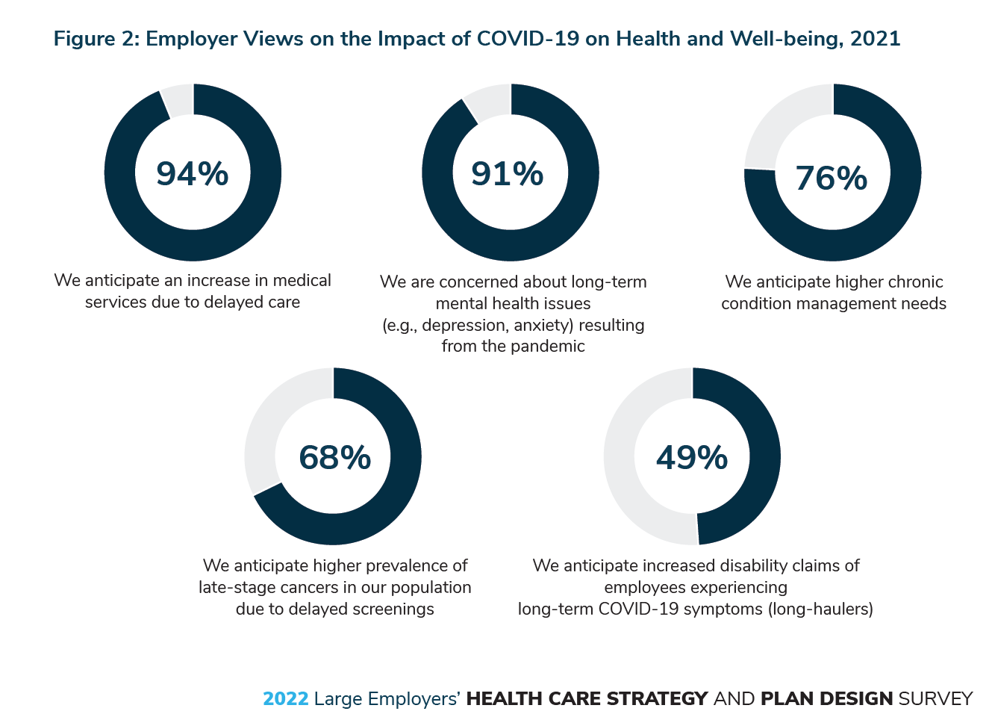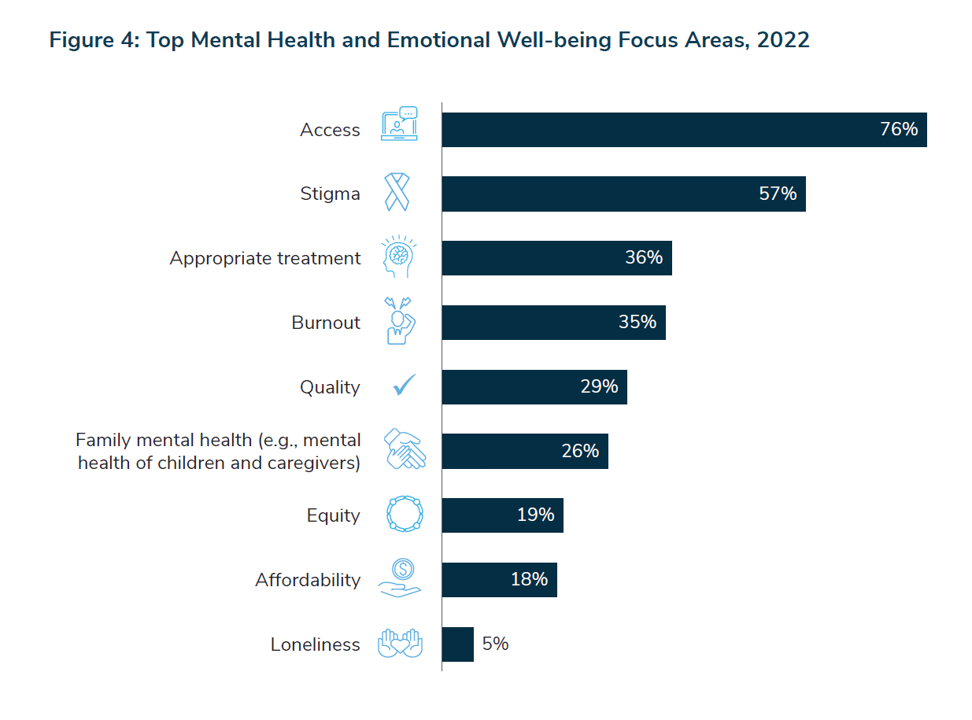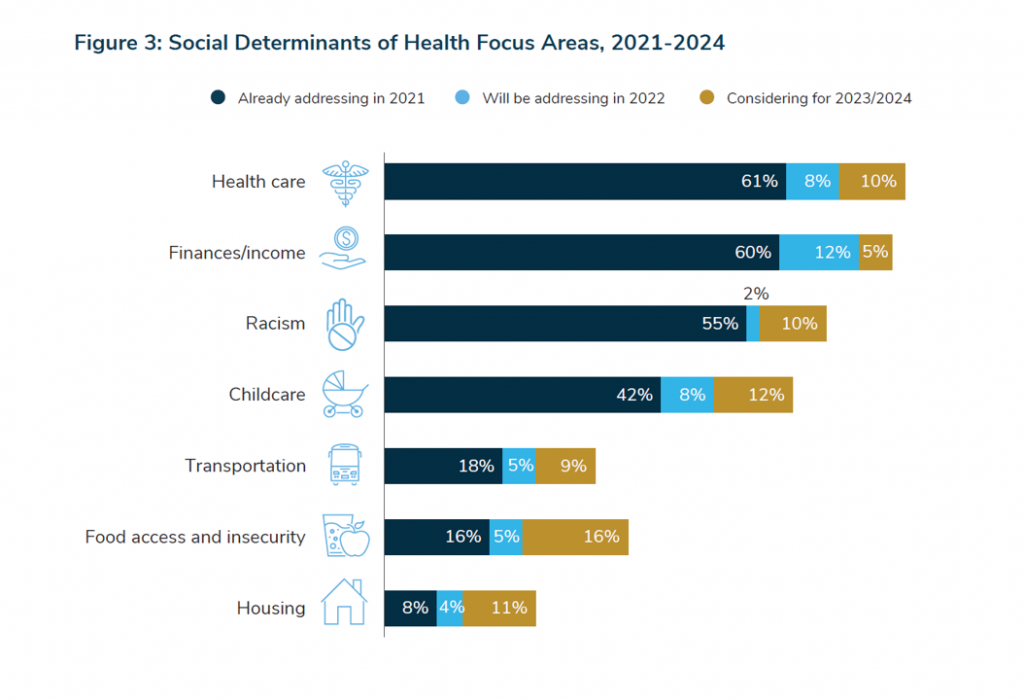One in two people in the U.S. receive health insurance through employers. As large employers tend to be on the vanguard of benefit plan design, it’s useful to understand how these companies are thinking ahead on behalf of their employees.
 With that objective, it’s always instructive to explore the annual study from the Business Group on Health, the 2022 Large Employers’ Health Care Strategy and Plan Design Survey.
With that objective, it’s always instructive to explore the annual study from the Business Group on Health, the 2022 Large Employers’ Health Care Strategy and Plan Design Survey.
As a result of the COVID-19 pandemic, large employees have many concerns about worker and dependents’ health.
The biggest firms in America providing health insurance for workers are expecting an increase in medical services due to people delaying care in the wake of COVID-19, as we approach the “second winter” of the pandemic.
Due to delayed screenings, two-thirds of employers also expect a higher prevalence of late-stage cancers in their staff, as well as one-half of companies anticipating a growth in disability claims due to long-COVID — long-term symptoms caused by the coronavirus.
Three in four firms also expect employees managing chronic conditions will have more acute management needs.
Nearly all large companies are also worried about the long-term mental health impacts of the public health crisis.
 “Social isolation and uncertainty due to the fluid nature of the pandemic proved to be an impetus for depression, anxiety and substance use disorders,” the report calls out.
“Social isolation and uncertainty due to the fluid nature of the pandemic proved to be an impetus for depression, anxiety and substance use disorders,” the report calls out.
The second bar chart, titled Figure 4 from the report’s summary, inventories many dimensions of mental and emotional well-being on which companies will focus on behalf of their employees.
Access to mental and behavioral health services rank top on this list, for three in four companies. Addressing the stigma that can be associated with mental health issues and asking for help to deal with them is second in line for employers, followed by channeling people to appropriate treatment, dealing with burnout, assuring quality of these services, and scaling mental health access to family members — children and caregivers.
The Business Group on Health notes that 2022 will be the first year that most employers will implement an anti-stigma campaign for mental health, with the objective of expanding access to these services for workers and dependents.
To that end, we can expect employers’ embrace of virtual health, which grew in adoption during the pandemic, to translate into tele-therapy and other forms of digitally-enabled mental health services in 2022 for employees and their families.
 Health Populi’s Hot Points: The role of the social determinants of health – factors in every life that shape peoples’ health and well-being at least as much as medical care does — has gained tremendous attention during the pandemic, among the entire ecosystem of health industry stakeholders.
Health Populi’s Hot Points: The role of the social determinants of health – factors in every life that shape peoples’ health and well-being at least as much as medical care does — has gained tremendous attention during the pandemic, among the entire ecosystem of health industry stakeholders.
That includes employers, who of course play a huge role in their workers’ individual health, and in aggregate, the population health of their workforces.
The scenario of how companies treat employees has also gained traction in the past few years, with the rise of consumers “voting with their feet” when it comes to patronizing organizations whose values reflect their own, along with rating agencies and third parties hazing companies’ approach to ESG — environmental, societal, and governance goals. The pandemic’s sharp reveal of health inequities and income inequality accelerated this trend.

Figure 3 arrays various social determinants targets undertaken by large employers in the study. While most employers were already addressing health care access, financial equity, and racism in 2021, more will be looking at finance — pay equity, minimum wage, and other household income issues — in 2022.
By 2024, areas of food access, childcare, housing, racism, and transportation will grow in focus for at least one in ten companies.
As the paragraph here from the study’s summary asserts, “employers are initiating programs and benefits to improve the circumstances that employees and their families are born into and live….with the goal of bringing about systemic change.”
I’ve been forecasting in my scenario planning work the growing role of private sector organizations playing in public health. We can point to CVS pharmacy’s quitting tobacco sales and re-branding as CVS health, Walmart’s growing footprint in health, and a growing number of large companies addressing social determinants of health as the chart above demonstrates.
As companies grow their “ESG muscles” to make concerted efforts to make their local worlds better places to work and live, we can expect more of such health-pivots on the road to building healthier communities and more resilient workforces in the aftermath of the COVID-19 pandemic.
The post Chronic Medical Conditions, Mental Health, and Equity On Employers’ Minds for 2022 – Employee Health in the Wake of COVID-19 appeared first on HealthPopuli.com.
Chronic Medical Conditions, Mental Health, and Equity On Employers’ Minds for 2022 – Employee Health in the Wake of COVID-19 posted first on https://carilloncitydental.blogspot.com
No comments:
Post a Comment